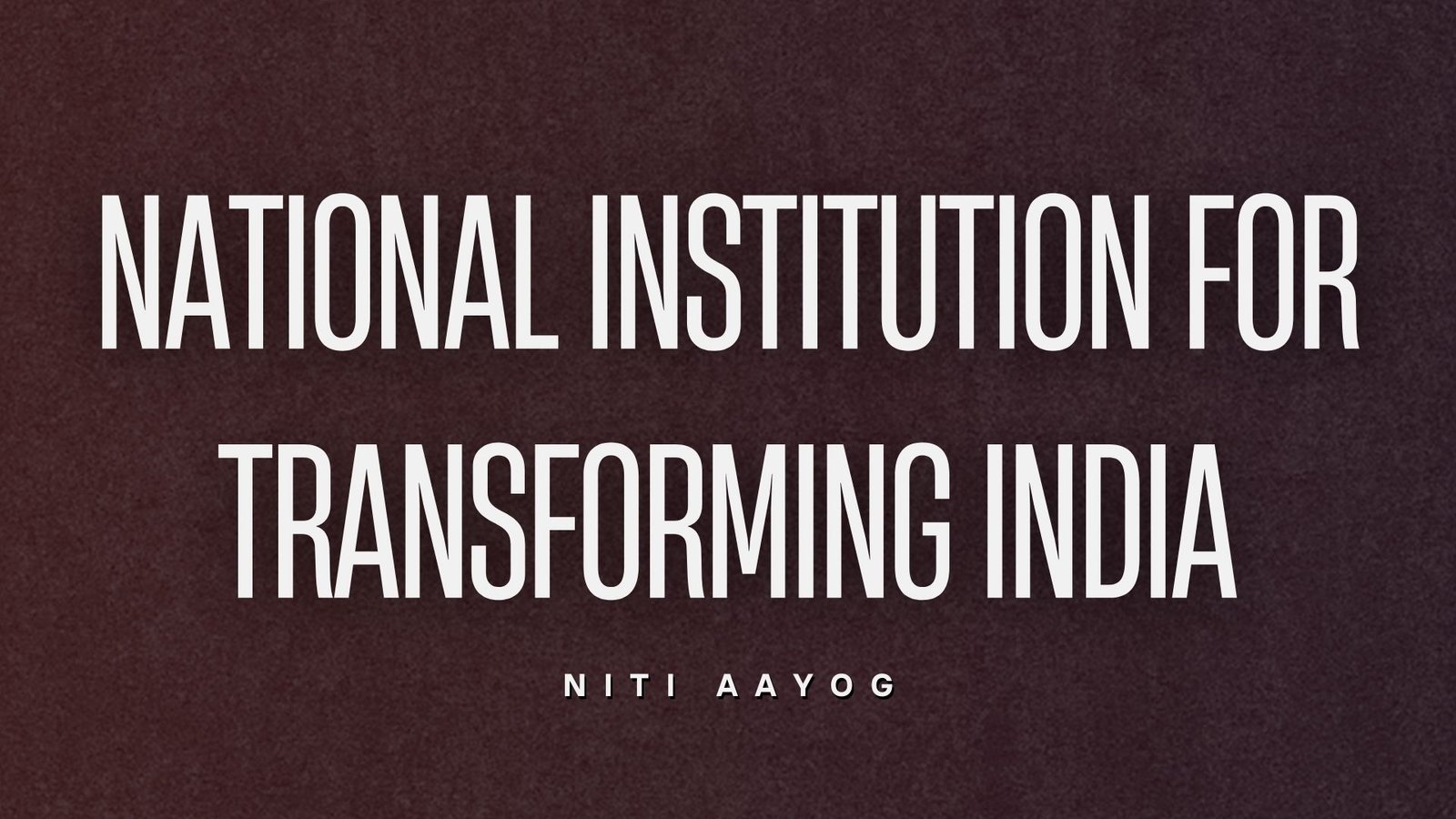On this page you will read detailed information about NITI Aayog.
As you delve into the world of Indian governance, you’ll encounter a pivotal institution shaping the nation’s future: NITI Aayog. This premier think tank, established in 2015, stands at the forefront of India’s transformative journey. You may wonder about its role in the complex tapestry of Indian policymaking. NITI Aayog, or the National Institution for Transforming India, serves as the government’s primary vehicle for crafting long-term strategies and fostering cooperative federalism. In this article, you’ll discover how this dynamic organization is revolutionizing India’s approach to development, bringing together diverse stakeholders, and propelling the nation towards its ambitious goals in the 21st century.
What is NITI Aayog?
NITI Aayog, which stands for National Institution for Transforming India, is the premier policy think tank of the Government of India. Established in 2015, it replaced the erstwhile Planning Commission, marking a significant shift in India’s approach to policy-making and governance.
Structure and Leadership
NITI Aayog is headed by the Prime Minister of India as its Chairperson, emphasizing its importance in the national policy framework. The institution comprises a Vice-Chairperson, full-time and part-time members, and a CEO, bringing together a diverse pool of expertise. Its Governing Council includes Chief Ministers of all states and Lieutenant Governors of Union Territories, fostering a spirit of cooperative federalism.
Objectives and Functions
The primary mandate of NITI Aayog is to serve as a catalyst for transformative change in India. Its key objectives include:
- Evolving a shared vision of national development priorities
- Fostering cooperative and competitive federalism
- Developing sustainable and inclusive strategies
- Serving as a knowledge and innovation hub
NITI Aayog functions through two main hubs: the Team India Hub for promoting cooperative federalism, and the Knowledge and Innovation Hub for research and advisory roles.
Guiding Principles
NITI Aayog’s approach is guided by several core principles, including:
- Antyodaya (upliftment of the poorest)
- Inclusion and sustainability
- Village-centric development
- Harnessing India’s demographic dividend
- People’s participation and good governance
As a dynamic think tank, NITI Aayog spearheads visionary policymaking, engaging both the central government and states in crafting policies that address India’s diverse developmental needs. It goes beyond its advisory role to act as a change catalyst, steering innovative initiatives and fostering collaboration to shape India’s socio-economic landscape.
Formation of NITI Aayog
NITI Aayog, which stands for National Institution for Transforming India, was formed as a premier policy think tank of the Government of India. This institution replaced the Planning Commission, providing a significant shift in the approach to national development.
Establishment and Vision
NITI Aayog was established on January 1, 2015, by a resolution of the Union Cabinet. The primary vision behind its formation was to foster cooperative federalism and develop a shared vision of national development priorities, sectors, and strategies with the active involvement of state governments.
Key Objectives
The formation of NITI Aayog was driven by several key objectives:
- To evolve a shared vision of national development priorities and strategies with the active involvement of states.
- To foster cooperative federalism through structured support initiatives and mechanisms with the states on a continuous basis.
- To develop mechanisms to formulate credible plans at the village level and aggregate these progressively at higher levels of government.
- To ensure, on areas that are specifically referred to it, that the interests of national security are incorporated in economic strategy and policy.
Structure and Composition
NITI Aayog’s structure was designed to be more inclusive and responsive to India’s diverse needs:
- The Prime Minister of India serves as the Chairperson.
- A Governing Council comprising Chief Ministers of all states and Lt. Governors of Union Territories.
- Regional Councils formed to address specific issues and contingencies impacting more than one state or a region.
- Special invitees appointed by the Prime Minister to support the think tank’s work.
This unique structure allows NITI Aayog to serve as a platform for the Government of India to bring states to act together in the national interest, thereby fostering cooperative federalism.
In the previous post, we had shared information about Understanding the Roles of State Public Service Commission in India, so read that post also.
Vision of NITI Aayog
Transforming India’s Development Landscape
NITI Aayog, the National Institution for Transforming India, was established in 2015 with a bold vision to revolutionize India’s approach to development. As the country’s premier policy think tank, NITI Aayog aims to foster cooperative federalism, promote sustainable and inclusive growth, and drive innovation across various sectors. The organization’s vision is deeply rooted in the idea of creating a “New India” by 2022, coinciding with the 75th year of India’s independence.
Collaborative Policymaking and Implementation
At the core of NITI Aayog’s vision lies the commitment to evolve a shared national development vision through collaborative efforts. By bringing together central and state governments, industry experts, and civil society, NITI Aayog strives to create a synergistic environment for policy formulation and implementation. This approach ensures that development strategies are tailored to address the diverse needs of India’s regions while aligning with national objectives.
Driving Innovation and Sustainable Growth
NITI Aayog envisions India as a global leader in innovation and sustainable development. Through initiatives like the Atal Innovation Mission (AIM) and the promotion of the “Lifestyle for Environment” (LiFE) movement, the organization seeks to cultivate a culture of entrepreneurship and environmental consciousness. By leveraging technology and fostering partnerships, NITI Aayog aims to propel India towards a $5 trillion economy by 2030, as outlined in its comprehensive national strategy.
Empowering Vulnerable Sections and Promoting Inclusive Growth
A crucial aspect of NITI Aayog’s vision is the commitment to inclusive growth and social justice. The organization focuses on empowering vulnerable sections of society, including Scheduled Castes, Scheduled Tribes, and Persons with Disabilities. By designing targeted policies and programs, NITI Aayog strives to bridge development gaps and ensure that the benefits of economic growth reach all segments of the population.
Objectives of NITI Aayog
NITI Aayog, India’s premier public policy think tank, has a multifaceted mission aimed at transforming the nation’s development landscape. Its objectives are both comprehensive and ambitious, designed to foster sustainable growth and inclusive progress across all sectors of the Indian economy.
Fostering Cooperative Federalism
One of the primary goals of NITI Aayog is to promote cooperative federalism. This involves actively engaging with state governments to develop shared visions and strategies for national development. By facilitating continuous support and collaboration, NITI Aayog aims to strengthen the federal structure of India’s governance system.
Driving Sustainable Development
NITI Aayog is committed to designing long-term policy frameworks and program strategies that ensure sustainable and equitable growth. This includes paying special attention to sections of society that may be at risk of not benefiting adequately from economic progress. The institution works tirelessly to create a knowledge and innovation support system that can propel India towards its development goals.
Enhancing Governance and Implementation
A crucial objective of NITI Aayog is to improve governance at all levels. This involves developing mechanisms to formulate plans at the village level and aggregating them at higher levels of government. The institution also focuses on monitoring and evaluating program implementation to strengthen the probability of success. By serving as a platform to resolve inter-sectoral and inter-departmental issues, NITI Aayog aims to streamline policy-making and implementation processes.
Promoting Innovation and Research
NITI Aayog strives to be a catalyst for innovation in the country. It aims to create a knowledge, innovation, and entrepreneurship support system that can drive India’s growth in the 21st century. By fostering partnerships with think tanks, research institutions, and other stakeholders, NITI Aayog seeks to harness the power of ideas and expertise for national development.
Governing Council of NITI Aayog
Composition and Leadership
The Governing Council of NITI Aayog serves as the apex body of this premier think tank, bringing together diverse perspectives from across India. Chaired by the Prime Minister, it includes Chief Ministers of all states and Lt. Governors of Union Territories, fostering a spirit of cooperative federalism. This unique structure ensures that NITI Aayog remains responsive to regional needs while formulating national policies.
Key Functions and Responsibilities
The Governing Council plays a pivotal role in shaping India’s development agenda. It serves as a platform for:
- Discussing and deliberating on critical policy issues
- Fostering collaboration between the Centre and States
- Identifying priority areas for intervention
- Monitoring the implementation of key initiatives
By leveraging the collective wisdom of its members, the Council helps NITI Aayog develop holistic and inclusive strategies for India’s growth.
Impact on Policy Formulation
Through regular meetings and consultations, the Governing Council significantly influences the direction of NITI Aayog’s work. It provides valuable insights into ground realities, helping to bridge the gap between policy formulation and implementation. This collaborative approach ensures that NITI Aayog’s recommendations are practical, relevant, and aligned with the diverse needs of India’s states and territories.
Future Outlook
As India navigates complex challenges and opportunities, the Governing Council of NITI Aayog will continue to play a crucial role in steering the nation towards sustainable and inclusive growth. By fostering dialogue, promoting innovation, and championing evidence-based policymaking, it remains an indispensable component of India’s governance framework.
Key Initiatives of NITI Aayog
NITI Aayog, India’s premier public policy think tank, has launched several groundbreaking initiatives to drive the nation’s development agenda. These programs aim to address various challenges and promote sustainable growth across different sectors.
Promoting Sustainable Lifestyles
One of NITI Aayog’s flagship initiatives is LiFE (Lifestyle for Environment), a global movement that encourages environmentally conscious lifestyles. This program seeks to nudge individual and collective action towards sustainability, aligning with India’s commitment to combat climate change.
Leveraging Data for Better Governance
To enhance data-driven decision-making, NITI Aayog has introduced the National Data and Analytics Platform (NDAP). This integrated platform provides accessible, inclusive, and actionable insights to policymakers, researchers, and citizens, fostering transparency and informed governance.
Advancing Clean Mobility
In the transportation sector, NITI Aayog has launched Shoonya, an initiative promoting zero-pollution urban mobility. This program accelerates the adoption of electric vehicles in commercial fleets, contributing to reduced air pollution and a cleaner environment.
Empowering Women Entrepreneurs
Recognizing the importance of gender equality in economic growth, NITI Aayog established the Women Entrepreneurship Platform. This initiative provides women entrepreneurs with access to funding, mentorship, and networking opportunities, fostering a more inclusive business ecosystem.
Exploring Alternative Energy Sources
NITI Aayog is also spearheading the Methanol Economy program, which explores the potential of methanol as an alternative fuel and chemical feedstock. This initiative aims to reduce India’s dependence on oil imports and promote a more sustainable energy future.
By implementing these diverse initiatives, NITI Aayog demonstrates its commitment to driving innovation, sustainability, and inclusive growth across various sectors of the Indian economy.
Criticism of NITI Aayog
Limited Power and Influence
Despite its ambitious goals, NITI Aayog has faced significant criticism since its inception. One of the primary concerns is its limited power compared to its predecessor, the Planning Commission. Unlike the Planning Commission, NITI Aayog lacks the authority to allocate resources, which has led to dissatisfaction among state leaders. This limitation has resulted in several Chief Ministers boycotting NITI Aayog meetings, highlighting the frustration with the think tank’s advisory-only role.
Allegations of Bias
Another point of contention is the perceived bias in the allocation of investment projects. Opposition-ruled states have alleged that BJP-ruled states receive more favorable treatment in terms of project allocation and budget distribution. This has led to accusations that NITI Aayog is not fulfilling its mandate of promoting cooperative federalism, but instead reinforcing political divisions.
Lack of Consultation with States
Critics argue that NITI Aayog has failed to effectively involve states in the decision-making process, particularly regarding financial matters. This lack of consultation has reduced states’ influence on fund allocation, contrary to the organization’s stated goal of fostering cooperative federalism. Some experts suggest that restoring certain consultation roles of the Planning Commission could help address this issue.
Questionable Data Practices
There have been concerns raised about NITI Aayog’s data practices. Some critics have pointed out that NITI Aayog’s revised GDP growth series, which lowered historical growth rates, may have been used to make current economic performance appear more favorable. This has led to questions about the integrity and transparency of the data used in policy-making decisions.
To address these criticisms, many suggest that NITI Aayog’s role should be re-envisioned to include more substantive responsibilities in resource allocation and state consultation. Only time will tell if NITI Aayog can overcome these challenges and fulfill its potential as India’s premier public policy think tank.
Comparison Between Planning Commission and NITI Aayog
Organizational Structure and Approach
The transition from the Planning Commission to NITI Aayog marks a significant shift in India’s approach to policy-making and economic planning. The Planning Commission, established in 1950, followed a top-down, centralized approach to policy formulation. In contrast, NITI Aayog, formed in 2015, adopts a bottom-up, participatory strategy that involves states as equal partners in the development process.
Power and Fund Allocation
One of the key differences lies in their authority and financial powers. The Planning Commission had the power to impose policies on states and allocate funds to state governments and central ministries. NITI Aayog, however, functions primarily as an advisory body without the authority to enforce policies or distribute funds. This shift has transferred the power of fund allocation to the Finance Ministry, promoting a more decentralized decision-making process.
State Involvement and Federalism
NITI Aayog places a stronger emphasis on cooperative federalism. Its Governing Council includes Chief Ministers of all states and Lieutenant Governors of Union Territories, fostering greater participation from state governments in policy-making. This approach aims to create a shared vision of national development priorities and recognize that strong states are essential for a strong nation.
Flexibility and Modernization
NITI Aayog’s structure is more flexible and modernized compared to its predecessor. It has fewer full-time members and includes new positions like CEO and Vice-Chairperson. The organization also appoints part-time members based on specific requirements, allowing for a more diverse range of expertise. This adaptable structure enables NITI Aayog to better address the current needs of the country in a rapidly changing global economic landscape.
NITI Aayog FAQs
NITI Aayog, or the National Institution for Transforming India, is India’s premier public policy think tank established in 2015. According to the official website, NITI Aayog’s primary objectives include providing strategic and technical advice to central and state governments, fostering cooperative and competitive federalism, and monitoring policy implementation. As the apex body for India’s development agenda, it aims to promote sustainable and inclusive growth while addressing key socio-economic challenges.
NITI Aayog plays a crucial role in strengthening India’s federal structure through various initiatives. To promote cooperative federalism, it facilitates joint decision-making and harmonized policies between the Centre and states. The think tank encourages states to learn from each other’s best practices, fostering a spirit of collaboration. Simultaneously, it promotes competitive federalism by encouraging states to compete in offering better policies, services, and incentives to attract investments and resources.
NITI Aayog leads several transformative programs aimed at accelerating India’s development. Some notable initiatives include:
i) The Aspirational Districts Programme, focusing on improving socio-economic indicators in underdeveloped districts
ii) Atal Innovation Mission, promoting innovation and entrepreneurship across the country
iii) Shoonya – Zero Pollution Mobility campaign, aimed at reducing air pollution through electric vehicle adoption
Additionally, NITI Aayog organizes various contests and challenges to encourage innovation and problem-solving among India’s youth, demonstrating its commitment to fostering a culture of creativity and entrepreneurship.
Conclusion
As you have seen, NITI Aayog plays a pivotal role in shaping India’s future through innovative policymaking and strategic planning. By leveraging cutting-edge technology, fostering collaboration, and promoting sustainable development, this think tank is instrumental in driving India’s transformation. As the country continues to face complex challenges and opportunities, NITI Aayog’s data-driven approach and emphasis on inclusive growth will be crucial in guiding India towards its ambitious goals. Understanding the work of this institution is essential for anyone interested in India’s progress and its evolving position on the global stage. NITI Aayog’s efforts will undoubtedly continue to influence India’s trajectory for years to come.
Disclaimer
The information and services on this website are not intended to and shall not be used as legal advice. You should consult a Legal Professional for any legal or solicited advice. While we have good faith and our own independent research to every information listed on the website and do our best to ensure that the data provided is accurate. However, we do not guarantee the information provided is accurate and make no representation or warranty of any kind, express or implied, regarding the accuracy, adequacy, validity, reliability, availability, or completeness of any information on the Site. UNDER NO CIRCUMSTANCES SHALL WE HAVE ANY LIABILITY TO YOU FOR ANY LOSS OR DAMAGE OF ANY KIND INCURRED AS A RESULT OR RELIANCE ON ANY INFORMATION PROVIDED ON THE SITE. YOUR USE OF THE SITE AND YOUR RELIANCE ON ANY INFORMATION ON THE SITE IS SOLELY AT YOUR OWN RISK. Comments on this website are the sole responsibility of their writers so the accuracy, completeness, veracity, honesty, factuality and politeness of comments are not guaranteed.
So friends, today we talked about NITI Aayog, hope you liked our post.
If you liked the information about NITI Aayog, then definitely share this article with your friends.
Knowing about laws can make you feel super smart ! If you find value in the content you may consider joining our not for profit Legal Community ! You can ask unlimited questions on WhatsApp and get answers. You can DM or send your name & number to 8208309918 on WhatsApp








